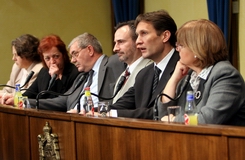- Serbia
Get to know Serbia
- Citizens
Culture and science
Health services
Pension and disability insurance
- Business
Employment
Economy
- Media
- Government
- Contact
Keep in touch
Contact form
Back
Keepin touch
Whether you have a question, comment, suggestion or any problem in the purview of the government, send us your message and we will try to respond as soon as possible. If your problem is not in our purview, we will forward your message to the relevant institution.
Q:
A:
New loan for continuation of reforms in secondary education in Serbia
Belgrade,
29 November 2005
Representative of the European Agency for Reconstruction (EAR) Dejan Suvakov said today that the European Investment Bank granted a €25 million loan to the Serbian government towards the continuation of reforms in secondary-school education and the building of nine new secondary schools.
Speaking at a press conference, Suvakov said that the first phase of a two-year programme initiated by the Serbian Ministry of Education and Sport, supported by the EU and funded by the EAR with €13 million, is coming to a close.
He said that the €25 million loan is very favourable and that it represents the greatest amount granted by the European Investment Bank for education in Serbia.
National director of the CARDS programme Gabrijela Bratic said that 55 secondary schools of electrical, mechanical and civil engineering, construction, agriculture and medicine have taken part in the first phase of the programme.
Bratic explained that new curricula dictated by the changing labour market have been introduced in those schools in an effort to meet the demands of new professions with new skills and required knowledge.
According to Bratic, new curricula have been composed for 20 professions requiring three or four years of secondary education and they include 214 school subjects or 1,727 modules.
Serbian Minister of Education and Sport Slobodan Vuksanovic pointed out that children should be educated for a concrete profession, so as to be able to find a job right after they finish school.
He recalled that schools with such curricula are now in demand, and that reforms are implemented in these schools in the same way as in the most developed countries.
While working on the programme, special attention was paid to developing human resources, equipping and reconstructing school facilities, and introducing social partnership in order to bring together all who are interested in creating jobs in the labour market. Furthermore, the Fund for Innovations was founded as another way of endorsing the reforms of the secondary education.
Head of the team for composing the programme Karsten Schmidt said that after being behind the times for several years, Serbia now has the most up-to-date concept of and approach to the reforms of the secondary-school education.
He said that the €25 million loan is very favourable and that it represents the greatest amount granted by the European Investment Bank for education in Serbia.
National director of the CARDS programme Gabrijela Bratic said that 55 secondary schools of electrical, mechanical and civil engineering, construction, agriculture and medicine have taken part in the first phase of the programme.
Bratic explained that new curricula dictated by the changing labour market have been introduced in those schools in an effort to meet the demands of new professions with new skills and required knowledge.
According to Bratic, new curricula have been composed for 20 professions requiring three or four years of secondary education and they include 214 school subjects or 1,727 modules.
Serbian Minister of Education and Sport Slobodan Vuksanovic pointed out that children should be educated for a concrete profession, so as to be able to find a job right after they finish school.
He recalled that schools with such curricula are now in demand, and that reforms are implemented in these schools in the same way as in the most developed countries.
While working on the programme, special attention was paid to developing human resources, equipping and reconstructing school facilities, and introducing social partnership in order to bring together all who are interested in creating jobs in the labour market. Furthermore, the Fund for Innovations was founded as another way of endorsing the reforms of the secondary education.
Head of the team for composing the programme Karsten Schmidt said that after being behind the times for several years, Serbia now has the most up-to-date concept of and approach to the reforms of the secondary-school education.
-
 Belgrade, 26 November 2025
Belgrade, 26 November 2025Serbia-Hungary partnership best example of European cooperation
-
 Belgrade, 22 January 2025
Belgrade, 22 January 2025Egypt one of Serbia’s closest partners on international stage
-
 Belgrade, 9 July 2024
Belgrade, 9 July 2024Support for 104 associations in diaspora that preserve Serbian language, culture
-
 Belgrade, 15 April 2024
Belgrade, 15 April 2024Competition for StarTech grants open until 31 May
-
 Belgrade, 2 October 2023
Belgrade, 2 October 2023Serbia respects Resolution 1244 and will do everything to preserve peace
-
 Belgrade, 13 September 2023
Belgrade, 13 September 2023Day of Serbian Unity to be celebrated outside borders of Serbia, Republika Srpska for the first time
-
 Belgrade, 8 August 2023
Belgrade, 8 August 2023RSD 24.2m in state aid paid out to citizens affected by storm
-
 Belgrade, 17 June 2023
Belgrade, 17 June 2023Belgrade is doing everything to preserve peace in Kosovo and Metohija
-
 Belgrade, 15 June 2023
Belgrade, 15 June 2023Slovenia will continue to support Serbia on its way to EU
-
 Belgrade, 5 May 2023
Belgrade, 5 May 2023Emergency measures, tightening of conditions for possessing weapons

